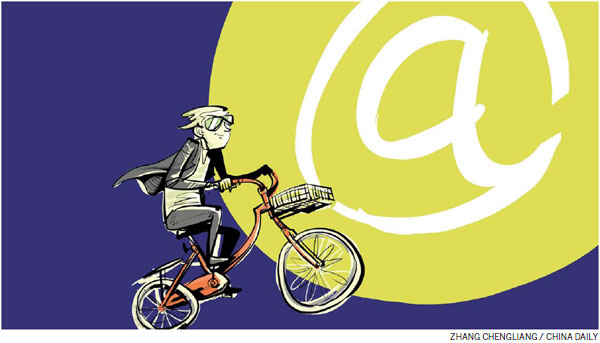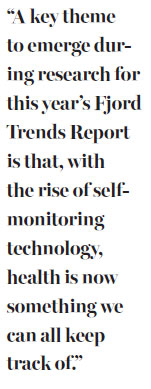Digital trends: What we'll see in 2016
Updated: 2016-04-08 08:20
By Inaki Amate(China Daily Europe)
|
|||||||||
Companies will need to stay on their toes if they want to keep up with consumer expectations
I recently shifted countries from Finland to China, and one of the most remarkable but unexpected consequences has been the realization that I may actually be living in the future.
The reason? My company, Fjord, puts out an annual global trends report for all marketers to capture - in broad strokes - the most significant technology and business developments we think will emerge in the year ahead. We base this on what clients are asking for, our experiences as citizens and users, and our well-informed (we hope) guesses on the effect of emergent technology.

But what I'm seeing in China is that many of these predictions are already taking shape - in innovative and intriguing ways. The market here continues to evolve at warp speed, and while most organizations in the West are still coming to grips with the second wave of digital disruption - mobile, in other words - consumer expectations in China are leaping ahead and changing the game. This means that, at a baseline level, companies need to stay on their toes, jumping on trends straight away and adapting their business models to suit.
So what are the new dynamics stirring the pot?
A key theme to emerge during research for this year's Fjord Trends Report is that, with the rise of self-monitoring technology, health is now something we can all keep track of. A new breed of "health-committed" consumers - especially younger, urban consumers - is using devices like wearable fitness trackers to gather data about their fitness levels.
All this is particularly pertinent in China, where savvy brands and retailers have already discovered that incentivizing customers to engage in healthy behavior can have a positive effect on profits. One way they're doing this is by forming partnerships with other companies, then rewarding customers who reach their wellness goals, sharing their data as they go.

Sports brand Li-Ning, for example, recently teamed up with smartphone maker Xiaomi, which makes the highly successful Mi Band wearable fitness tracker, to produce a new generation of smart running shoes at an affordable price. Thanks to smart chips placed in the soles, these Li-Ning running shoes can be connected with a Xiaomi mobile app that allows runners to track their progress, analyze their form and monitor their achievements.
At the same time, with an overburdened public health system that often results in lengthy waits for patients at hospitals just for a short consultation, many people are turning to technology for more effective access to China's healthcare system. Apps such as Haodaifu and Chunyu Yisheng that allow patients to connect remotely with doctors to discuss ailments have mushroomed in the past year.
Fjord's view is that to be really effective in the healthcare space, companies must take to heart the idea that in every product there is a service waiting to get out, which means integrating a holistic service providing added value through digital services like telehealth, wellness programs, connected devices and smart pills. They will also have to invest in consumer-facing brand development.
Our research also reveals how digital technology is elevating our standard of living to the point where the luxury service market is opening up to the masses. Thanks to apps like Uber, Instacart and Nowait, we can have chauffeurs drive us around, get groceries delivered to our door, and skip the queues in restaurants. The mindset is that ordinary folk should be able to summon whatever they need instantly with the tap of an app.
This certainly holds true in China, where consumers everywhere are eagerly adopting such services. What's more, thanks to data ubiquity and end-to-end customer experience engineering, the trend is taking hold across a wide range of industries, from banking to healthcare, education and shopping. In the future, any industry with traditional roles and privileged expertise will be challenged. For example, peer-to-peer lending will increasingly help people often rejected by banks. Digital education platforms (think edX and the Khan Academy) can also offer high-quality education courses to a wide range of takers.
Our view is that this trend opens up a gap in the true luxury market. What does it take to remain a luxury brand in this era of digital democratization? Companies should examine their role from the consumer perspective and ask how they can disrupt their service model now that delivering luxury can be done by anyone.
Services with manners
Collection of personal data is nothing new, but in an increasingly data-driven economy, digital trust is more important than ever. Companies that fail to earn consumer trust in how they collect, store and control data will not only lose business and face possible legal ramifications, but they will also fail to reach their full potential. We call the etiquette of investing in respectful data practices "services with manners".

All this is especially important in China, with its strong digital-first mentality. Here, most consumers prefer to do business with retailers who use personal information if it makes their shopping experience more relevant and seamless. They are already used to interacting with multiple smart devices, from TVs to embedded consoles in their cars, and take it for granted that they should be able to switch between them while watching a movie or shopping online. But the challenge for brands is to deliver these personalized services while avoiding any concerns these customers might have about data privacy.
Our view is that, to get ahead, companies should beef up resources dedicated to data privacy and security. Be transparent with consumers about transition states. On a systems level, invest in new platforms and technologies equipped to handle data responsibly through the supply chain.
The good news here is that the government has begun initiatives to reverse engineer any consumer distrust with innovative solutions. September saw the launch of China's first national big data pilot zone, in the southwestern province of Guizhou. The zone will be an experiment in big data sharing, security and innovation - one project involves building a cloud-based big data platform, called Guizhou on the Cloud, to enable provincial government data to be pooled, shared and exchanged. Such developments indicate that coming up with cutting-edge solutions for data privacy and security is an increasingly important part of the national agenda.
I believe 2016 will be another defining year for digital and will bring even more transformation, disruption and delight to organizations and their audiences. Certainly, China's leading-edge companies paint a compelling picture of what is possible when the potential of smart, connected, contextually aware digital services is fully harnessed.
What's required, though, is more than just great products or great advertising. Rather, it's offerings that "wrap" customers - that combine the ability to generate meaningful consumer insights with the agility to act on those insights quickly and proactively. Brands that become a "living service" in this way will be able to create the differentiated sales and service programs that will, in turn, enable them to acquire and retain more customers.
Will yours be one of them?
The author is group director at service design consultancy Fjord in Hong Kong. The views do not necessarily reflect those of China Daily.
Today's Top News
Inspectors to cover all of military
Britons embrace 'Super Thursday' elections
Campaign spreads Chinese cooking in the UK
Trump to aim all guns at Hillary Clinton
Labour set to take London after bitter campaign
Labour candidate favourite for London mayor
Fossil footprints bring dinosaurs to life
Buffett optimistic on China's economic transition
Hot Topics
Lunar probe , China growth forecasts, Emission rules get tougher, China seen through 'colored lens', International board,
Editor's Picks

|

|

|

|

|

|







